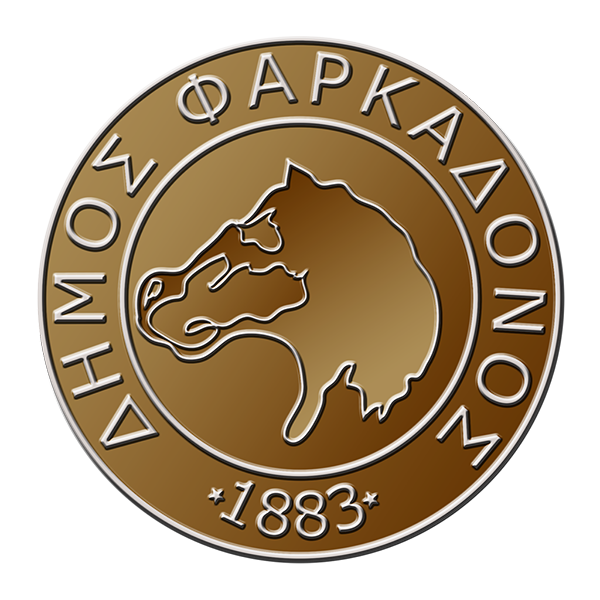Oichalia was an ancient city-state in the region of Thessaly.
Etymology of the word Oichalia:
The name of Oichalia is a compound word
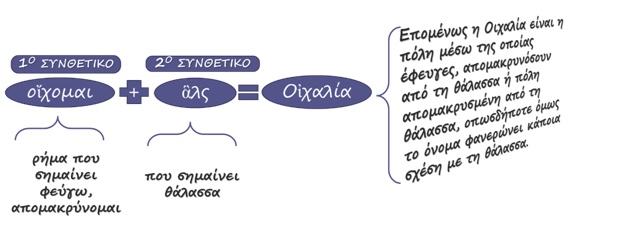
This fact reinforces the opinion that the area not far from Oichalia was a large lake, perhaps a remnant of the floods that occurred in 8000 BC. and had the effect of turning the entire lowland area into a huge lake.
THE FLOODS OF 8,000 BC
The Deluge of Deucalion
One of the most important myths of Greek Mythology takes place in our region thousands of years ago (estimated around 9000 BC. According to the myth, at the time when Deucalion reigned in Phthia and Thessaly, Zeus decided to destroy the entire generation of people who were corrupt, with the exception of the righteous king and his wife Pyrrha.
Deucalion therefore, following his father’s advice, built a ship, collected the necessary supplies for their survival and boarded the ship with his wife. In the meantime Zeus opens the waterfalls of Heaven and the land of Greece is filled with water and people perish. For nine days and nine nights the royal couple roams the waters in the boat. On the tenth day, however, he ran aground on Mount Orthrys, according to another version, on Parnassos.
The scientific point of view
So with the end of the last Ice Age and the retreat of the glaciers, the sea level rose at a rapid rate, about 12 millimeters per year until 6,000 BC. and then the uplift rate slowed to 2 millimeters per year.
Κατά τη διάρκεια αυτής της περιόδου, καθώς η θάλασσας ανέβηκε απότομα περίπου 100 m, σταδιακά κάλυψε μεγάλη έκταση της ξηράς και οι ακτογραμμές μετατυπώθηκαν σημαντικά προς το εσωτερικό. Έτσι, οι πληθυσμοί που ήταν εγκατεστημένοι στις ακτές, αφού οι οικισμοί τους καταποντίστηκαν, αποτραβήχτηκαν στα ενδότερα. Είναι λοιπόν πολύ πιθανό, ο μύθος του κατακλυσμού να απηχεί το πραγματικό κοσμογονικό αυτό γεγονός.
Geographical placement
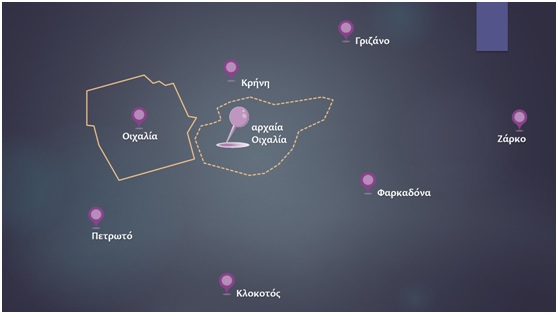
Oichalia and Eurytus, its most important king, were claimed as their children by many regions of Greece (Messinia, Euboia, Eurytania), but the most valid seems to be that of Thessaly. This view is based on Homer who was the first ancient writer to mention Eurytos’ Oichalia and place it in Thessaly. This reference is contained in the B rhapsody of the Iliad where Homer lists the ships and kingdoms that participated in the Trojan War.
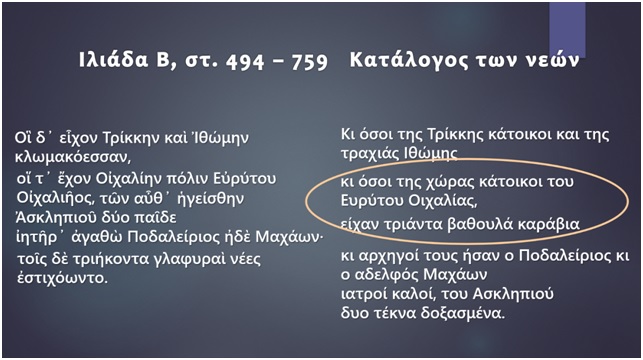

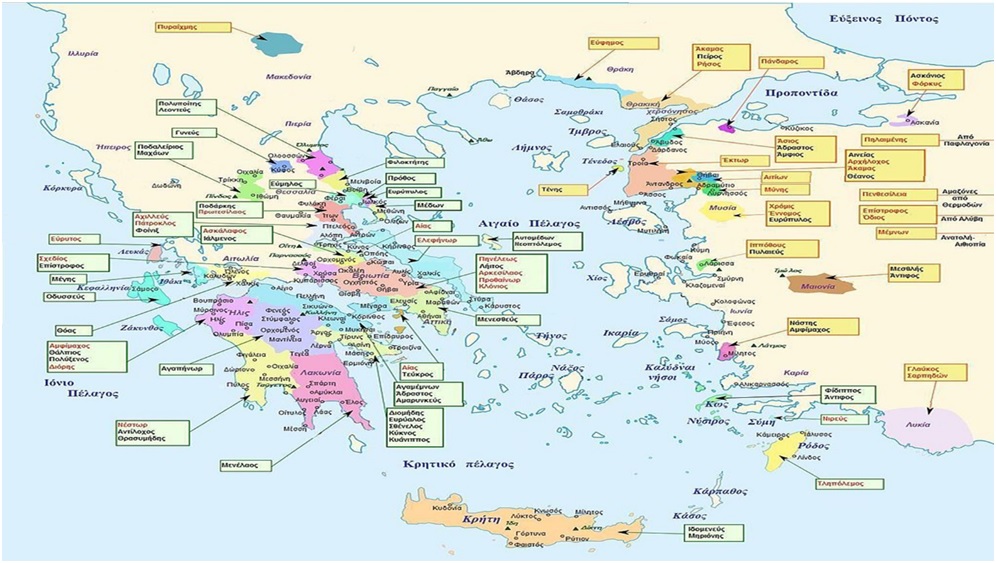
This point of view is given even more weight by the fact that Homer, for writing this catalog, relied on pre-existing texts that carried this information and date back to the Mycenaean era (1600-1100 BC). A special mention is made by Homer of Iphitos son of Eurytus of Oichales and in the Odyssey.
Also important is the reference of Strabo who places Oichalia in the area of Thessaly and specifically in the area near Trikki and Farkadona.
… αὐτὸς δ᾽ ὁ Πηνειὸς ἄρχεται μὲν ἐκ Πίνδου, καθάπερ εἴρηται, ἐν ἀριστερᾶι δ᾽ ἀφεὶς Τρίκκην τε καὶ Πελινναῖον καὶ Φαρκαδόνα φέρεται παρά τε Ἄτρακα καὶ Λάρισαν, καὶ τοὺς ἐν τῆι Θετταλιώτιδι δεξάμενος ποταμοὺς πρόεισι διὰ τῶν Τεμπῶν ἐπὶ τὰς ἐκβολάς. Τὴν δ᾽ Οἰχαλίαν πόλιν Εὐρύτου λεγομένην ἔν τε τοῖς τόποις τούτοις ἱστοροῦσι καὶ ἐν Εὐβοίαι καὶ ἐν Ἀρκαδίαι, καὶ μετονομάζουσιν ἄλλοἶ ἄλλως, ὃ καὶ ἐν τοῖς Πελοποννησιακοῖς εἴρηται. Περὶ δὲ τούτων ζητοῦσι καὶ μάλιστα τίς ἦν ἡ ὑπὸ Ἡρακλέους ἁλοῦσα, καὶ περὶ τίνος συνέγραψεν ὁ ποιήσας τὴν Οἰχαλίας ἅλωσιν. (Στράβων, Γεωγραφικά Βιβλίο Θ, κεφ. 5, § 5.17)
It is worth noting that in his Geographies Strabo also meets other cities with the name Oichalia in other regions of Greece. But he accepts the opinion of Apollodorus who says that if there were two cities named Oichalia, then Homer would separate them as he did in other similar cases.
Acne and destruction of the city
Its most famous king was Eurytos, during whose reign Oichalia experienced its greatest prosperity (12th century BC). The ancient city definitively ceases to exist after 1000 BC. – 800 BC and the predominance of the Thessalians in the region.
The destruction of the city
The best-known story of Oichalia, according to the mythological tradition, is that of Hercules and Ioli, which also led to the destruction of the city. Hercules fell in love with Ioli and asked her in marriage. But Eurytos, in order to part with his only daughter, announced a pan-Hellenic archery match with Ioli as a prize for whoever defeated him. Hercules, who ironically had learned the art of archery from Eurytus himself, managed to defeat him. Then Eurytus and his sons pretended that they were afraid that the hero might again be seized with rage and kill his children, and refused to hand over Iolis to him. Of the children of Eurytos, only Iphitos took the side of Heracles and claimed that Ioli should be given to him. Hercules then left for a while to save Alcestis from the hands of Hades.
Returning, he found Eurytus still refusing to give him his daughter. In fact, some oxen or horses had been stolen from him and he blamed the hero for the theft. Iphitus said that they would find them and that it was not Heracles’ fault. But before they set out on the search, Heracles was seized with rage again and killed Iphitus. At this point the mythical tradition has many variations. According to one, when Herakles came to his senses he repented and first wanted to purify himself for his new crime, as he had fallen ill after the death of Iphitus. So he traveled to Delphi and received an oracle that he should be sold as a slave and pay compensation to Eurytus. Eurytus did not accept the money, but Hercules remained a slave of Omphalis for three years. He then returned to Oichalia, conquered the city, killed Eurytus and his sons, and carried Ioli to Trachina with the intention of making her his wife.
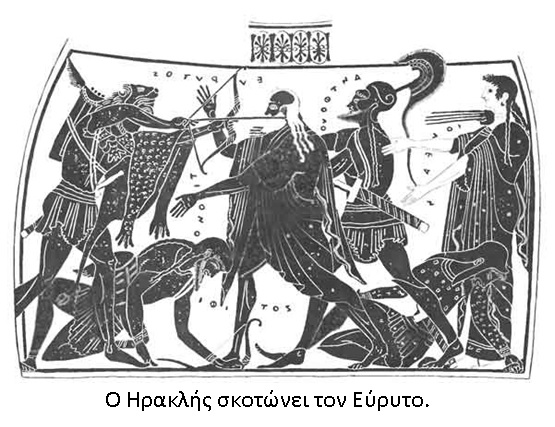
According to another version (Apollodorus, B 7,7) the hero directly asked for the help of the Arcadians, the Milia of Trachina and the Epiknemids of Locrons, campaigned against Oichalia, captured it and killed Eurytos and his sons.
Ἡρακλῆς]… ὡς δὲ εἰς Ὀρμένιον ἧκεν, Ἀμύντωρ αὐτὸν ὁ βασιλεὺς μεθ᾽ ὅπλων οὐκ εἴα διέρχεσθαι• κωλυόμενος δὲ παριέναι καὶ τοῦτον ἀπέκτεινεν. ἀφικόμενος δὲ εἰς Τραχῖνα στρατιὰν ἐπ᾽ Οἰχαλίαν συνήθροισεν, Εὔρυτον τιμωρήσασθαι θέλων. συμμαχούντων δὲ αὐτῷ Ἀρκάδων καὶ Μηλιέων τῶν ἐκ Τραχῖνος καὶ Λοκρῶν τῶν Ἐπικνημιδίων, κτείνας μετὰ τῶν παίδων Εὔρυτον αἱρεῖ τὴν πόλιν. καὶ θάψας τῶν σὺν αὐτῷ στρατευσαμένων τοὺς ἀποθανόντας, Ἵππασόν τε τὸν Κήυκος καὶ Ἀργεῖον καὶ Μέλανα τοὺς Λικυμνίου παῖδας, καὶ λαφυραγωγήσας τὴν πόλιν, ἦγεν Ἰόλην αἰχμάλωτον.
Free rendering of the text:
When Hercules arrived at Ormenio, King Amydorus did not allow him to enter armed. And because he prevented him from passing, Hercules killed him. Arriving in Trachina, he assembled an army against Oichalia, wanting to punish Eurytus. The Arcadians, the Miliians from Trachina and the Epicnimidians of Locroi allied themselves with him. And after killing Eurytus and his children he destroyed the city. After burying those who campaigned with him and were killed, Hippasus Kyus and the children of Lykymnius, Argeus and Melanus, he plundered the city and took Iolis prisoner.
